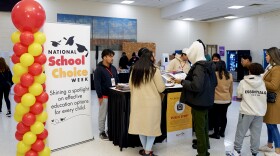Connecticut Foodshare, the state’s largest food bank, is struggling to meet increasing demand after a round of aggressive federal funding cuts.
Local food banks lobbied for increased funding in the state's most recent legislative session, receiving a total of $9 million across two years in the finalized budget. However, Jason Jakubowski, president and CEO of Connecticut Foodshare, fears this may not be enough.
“The unfortunate truth is that the extra funding that we got from the state is not going to completely fill the hole that we're going to have from the federal government,” Jakubowski said.
Earlier this year, the federal government cancelled the Local Food Purchase Assistance (LFPA) program. It allowed food banks and school districts to purchase products from local farmers. Connecticut Foodshare lost $1million in this program alone.
In addition, cuts were made to The Emergency Food Assistance Program (TEFAP) costing Connecticut Foodshare 35 truckloads of food, amounting to roughly $1.7 million.
Jakubowski explains there are two major concerns, what Connecticut Foodshare has lost already and what it anticipates losing, especially with the potential passage of the Trump Administration’s “Big Beautiful Bill."
Jakubowski said this piece of legislation could create further cuts to vital programs like the Supplemental Nutrition Assistance Program (SNAP) and Medicaid, which in turn would increase pressure on local food banks.
“If people have less money to spend on groceries, that's more of a need they're gonna have coming to our local pantries or coming to the food bank or going to one of our mobile trucks. I could tell you if our lines triple overnight or double overnight, we don't have enough food to be able to make up that difference,” Jakubowski said.
While Connecticut Foodshare gets close to 95% of its funding from private donors, Jakubowski says the issue isn’t the money, it’s the food.
He said 30% of Connecticut Foodshare’s food supply comes directly from the federal government, and food banks are not structured in a way that allows for food to be easily purchased.
"We are designed to take donated food from grocery stores and from other retail outlets and other wholesale outlets, and redistribute that food. So this would be a major, major shift, not just for us here at Connecticut Food share, but for the entire food banking industry across the country,” Jakubowski said.
Jakubowski expects this reckoning to happen as the federal government crackdown continues. In the meantime he is urging Connecticut residents to do their part by donating and volunteering. He also encouraged awareness about the pervasiveness of food insecurity in Connecticut.
“Despite being the richest state in the country, there is food insecurity. There are people who go hungry in each of the 169 towns, whether it's a major city, whether it's an affluent suburb, or whether it's a very small rural town," Jakubowksi said.
To find more information about access to your local pantry visit ctfoodshare.org.




